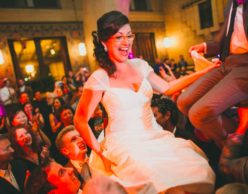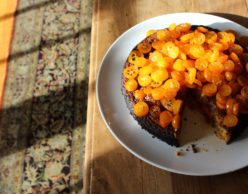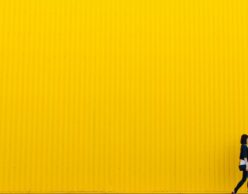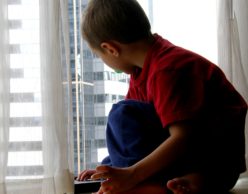Jasmine Guillory On Writing Black Women’s Joy
![[Image Description: Photo of a Black woman smiling into the camera. She has shoulder-length brown hair with gold highlights, and is wearing red lipstick and a purple shirt with a zig-zag pattern. The sunlight is shining on the side of her face.] Photo Credit: Andrea Scher](https://www.mashupamericans.com/wp-content/uploads/2021/02/Standard-New-Site-Feature-Image-Size-1140-x-400-2.jpg)
Mash-Up HQ can use 100% more joy in our lives, and we’re betting you can, too. Enter: Jasmine Guillory. Black-American-New-Orleans-to-California Mash-Up Jasmine (she/her) is the New York Times bestselling author of six romance novels, including Party of Two, The Wedding Date, The Proposal, and the upcoming While We Were Dating. Her work has appeared in O, The Oprah Magazine, Cosmopolitan, Bon Appetit, and Time. She lives in Oakland, Calif. How many times have we re-read her books in the pandemic? Hard to say! She sat down with The Mash-Up Americans to talk about delighting in her friendships, writing real-life characters, and feeling free to change her mind.
Your work always delights us. What brings YOU delight right now? How do you cultivate that?
I try to snatch joy wherever I can find it, because it’s been difficult during the pandemic and a lot of my usual outlets are not available! I think August was my worst month of the pandemic, partly because that was when it set in that, oh, we’re gonna keep doing this for a long time. And then the election was coming up, and then there were all the fires, so I couldn’t even go for a walk. I had been having regular backyard meals with one friend at a time, and then we couldn’t do that anymore, because the air quality was so bad.
So I just started going on aimless drives. And it was so nice to be outside in the sunshine, even though I was still in my car with the windows up. So once a day, I started going for a 20 minute drive, like I was an old person on Sunday. It was like one of the little things that just sort of kept me going. And I’ve been having regular FaceTime calls with two of my best friends since March. We’ve are very type A about it. We have a spreadsheet where we have an agenda, and our families know they can’t interrupt that call. [laughing] Having those calls once a week has brought a lot of joy.
With the pandemic changing so many aspects of how we spend time, how we gather, how we move through our days… has it changed the ways you imagine writing about your characters and the situations they are in?
That is something that I have thought about a lot! My book that comes out next summer was not set in the pandemic world. It brought me a lot of comfort to write about people enjoying life. I do know there were people who read Party of Two, that came out in June 2020, a few months into the pandemic, and who did feel happy to imagine having parties again. But there are times I’ve asked myself, “Will people be shaking hands when they meet each other again? Maybe I’ll just take this shaking hands out of the draft…”
![[Image Description: Photo of a Black woman smiling at the camera. She has shoulder-length brown hair, and is wearing red lipstick, large round gold earrings and a royal blue shirt. Her fingernail polish matches her shirt, and she is wearing rings on her fingers. In her hands she is holding up her novel Party of Two.] Photo Courtesy of Jasmine Guillory.](http://www.mashupamericans.com/wp-content/uploads/2021/02/JasmineGuillory_031221_EDITED_2.jpg)
Speaking of expansiveness of life, how do you think about writing futures into being through your books and characters?
There have definitely been moments, especially over the past few years, where I’ve felt like writing joyful, optimistic futures for Black women felt revolutionary.
What I want to do is write the world in which Black women are all flourishing.
Seeing the news and the way that people talk about us and the way that the media does, and the police and all of that, what I want to do is write the world in which Black women are all flourishing. I want to write about what we can do, what we can feel, what we can enjoy. I want that in my books, and I want people to read my books and feel like, yeah, I can do that.
You were hesitant to call yourself a writer for some time. How have you relaxed into that? What do you call yourself now?
You know, I think it took taking myself seriously as a writer, in order to be able to call myself that. So I don’t struggle with it now. But at the beginning, I wasn’t sure what this was. Like, is this really going to be something for me? Am I going to have to give it up? Am I going to keep working as a lawyer? I’d wanted to be a lawyer since I was in seventh grade. That was my goal in life. And then I did it. And I was like, [whispers] “I don’t like this.” That had always been part of my identity. And then, when I didn’t want it anymore, that was kind of hard to wrap my mind around. But it is no longer a struggle for me to call myself a writer.
That’s also a theme in your books — getting to change your mind, getting to have multiple experiences, being able to have nuance in our journey. It’s not always easy to find that in the world.
Right. Like, it turns out something that was good for me five years ago is not good for me now, and that is okay. Now I can do something different, you know?
Who’s your favorite character?
Well, there are two answers to this. One is I love them all very much. They are all my babies, and I cannot choose any of them. But the other answer is, my next book, which will come out in July, titled While We Were Dating — those characters are definitely my favorites. That is probably partly because it is the book that I just finished. And so I feel the most tender and loving towards it. My favorite is often the book that has just come out, but I do really love this book a lot.
How do you approach understanding and inhabiting each of your characters?
All my books up until now, after my first book, have all included a character from a previous book. When figuring out my characters, a lot of times I latch onto a handful of characteristics that I know about them. Sometimes it starts with somebody that I know, right? Like, anybody who has read Royal Holiday and knows me, knows that there’s a lot of Vivian in my mother. And Vivian is not my mom, and she makes different choices, but I sort of grab on to a handful of stuff. And then once I start writing, the character changes, and they become their own person. My first drafts are always very long and sloppy and confused, as I’m just writing my way into who these people are.
I always outline a book before I start writing it. A lot of times the outline really veers from what I ended up writing. But when I was writing The Wedding Party, it plans like midway through the book for the sex scene where Maddie would come to Theo at work and close the door, and they would have sex on his desk, and he would be super hot. And then I start writing that scene. And I was like, Theo would never do that. He is way too uptight for that. He would be like, “I’m sorry, I am a city employee. What are you trying to do here?” So it’s a lot of fun getting through my first draft, but then a lot of times, the second draft is like, Well, now let me cut those 10 chapters, now that I know who these people are.
We’re obviously huge fans, and part of it is — How do you make the relationships and communication mishaps in your books feel so real?
It’s definitely kind of a romance trope. Some critics are like, “Why don’t they just talk to one another?” Okay, have you met people? [Laughs]
People, in general, aren’t good at just talking to one another. Like, have you read an advice column where someone is like, “I have this three-year-long struggle with a friend of mine, I have never told her about it.” People aren’t good at actually expressing their feelings to other people, especially when it’s something difficult. And so I think the key thing is to figure out with characters is, why doesn’t she want to tell him this? Why doesn’t he want to talk to her about this? Like, why has this person been holding this secret? Or why can they talk about all these other things, but not this one? Because everybody has that thing that they don’t want to talk about. And sometimes if someone pushes those buttons of yours, and then you explode about it, that makes sense.
My goal is always for characters in my books to feel like real people who have things that they struggle with and aren’t good at. And sometimes they’re really good at other things. But, you know, I want them to feel like real people. And so when they do have flaws and fights and miscommunications, it feels like a fight that a real couple would have, or that a real group of friends would have. I want all of the relationships in my books, whether they’re family or friends or romantic, to feel like real relationships.
What kinds of practices do you use to support your writing craft?
I make playlists for each book, but I don’t listen to them when I’m writing. I listen to them at all other times, except for writing — I can’t write while listening to anything. So I try to build in time to my days where I have kind of that space to daydream, whether it’s driving around, or going for a walk, or just hanging out in the bathtub or whatever. But it’s times when I’m not reading something else or on my phone or watching something. And that’s hard, I think especially now sometimes, because there’s not a lot of interaction with other people right now.
I have really realized that I need to build in that time to just let my mind go free. Because sometimes there’s something that I’m struggling with really hard about a book or a scene, and I just have to trust myself and give myself time and space. And as soon as I kind of let myself stop actively working on it, and give myself time to relax about it, then I come up with solutions. I can’t force it or do it too quickly. So when I’m working on a book, I do usually try to work at least a little bit every day. And that I think keeps it alive in my brain. Even if I write a scene that I’m like, well, that was terrible. At least I know. And then it’s like, okay, well, I can’t do it like that, how do I fix it? And so that’s something that I can keep thinking about as I’m driving to Target or whatever. I also just like to give myself break time, that’s something that I really tried to do is take time off in between books. And hopefully when we can take vacations again, that’s something I’m looking forward to!
US TOO! Being home all of the time has been a real challenge. Where do you feel most at home?
I think, for me, it’s not really about where, but about who. It’s like, who is with me? Because I definitely feel most at home when I’m with my good friends, because those are the people that I know I can be completely myself with — which is a really wonderful thing.
What would you put in your time capsule of the last year?
Silly thing, but a ring light. [Laughing] It’s not something I would have ever considered purchasing for my home before, but now it’s like my constant companion.
What are you watching and reading right now for joyful marination?
So I actually just turned in my revisions of While We Were Dating last week. I had been holding Bridgerton as my reward for turning in that, so I’m just starting that and it’s very exciting.
What’s your bubbemeise?
Both sides of my family originally from New Orleans, La. My great, great grandmother, I think, taught my mother, who taught me, that when you brush your hair and pull the hair out, you always have to put it down the toilet or burn it or something so that somebody else doesn’t get their hands on it and do something bad to you. I do it every time.
And the woman stopped me and she was like, “We know how to spell your name here.
My grandparents were all born in Louisiana, and then all moved to California. So I have been back to visit, it is always lovely. Because I remember the very first time I went to New Orleans, I was checking into a hotel, and I said my last name and started to spell it, which is what I automatically do anytime I’m saying my last name. And the woman stopped me and she was like, “We know how to spell your name here.” And I was like, “Oh, that’s right. I’m in Louisiana, you know how to spell my name here.”
One of the first times I was there with my mom, I remember we were sitting at brunch and looking around, and I was like, everybody here looks like somebody in my family. Those old women over there look like my aunts. So even though I haven’t spent a lot of time there — I think I’ve visited four times — it does feel very familiar and wonderful to me whenever I’m there.
Are there any family traditions or self-created traditions that are especially important to you?
There are these muffins that my mom and I make at Christmas every year. And the funny thing is, because they were from this very specific time, the muffins have bran flakes in them, which sounds gross, but they’re delicious. And bran flakes were a thing that people used a lot in the 80s, but aren’t as easy to find anymore, because you know how food trends change, right? So every year it’s like, Oh, God, where can we find the bran flakes? And then we always find them and make the muffins and they’re amazing.
Once you’ve set your work out into the world and it has its own life, what is some of the most meaningful feedback you’ve received?
When people tell me that they see themselves in my books, and that they don’t usually get that, that just means so much to me to hear. I really love hearing that from people. But especially through the pandemic, people have told me that my books brought them comfort, and that reading them made them really happy. And that makes me so emotional, because it’s been such a hard time, it’s still such a hard time, and just the idea that anything that I have done could help someone through 2020 really means so much for me to hear.





